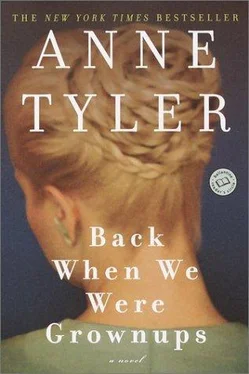“Rebecca. Joggers don’t carry umbrellas.”
“How do they stay dry, then?” she asked him. But she was just being silly now, trying to get him to laugh.
After they said goodbye, she instantly sobered. The torn feeling seemed to have grown more pronounced, spreading its ragged edges deep inside her. She sat upright against her pillows and fixed her gaze on the phone. But no one else called.
* * *
The time that was finally settled on for the baby-welcoming was Labor Day. Another picnic lunch on the North Fork River, was the plan, except that Hurricane Dennis moved through the area over the weekend and they changed it to an indoor event.
The general theme turned out to be medical emergencies. First Joey was stung by a bee that had somehow found its way into the front parlor, and he had to be rushed off for a shot because he was allergic. Min Foo and Hakim, of course, were the ones who took him, along with the guest of honor since Min Foo was breast-feeding. This made the whole occasion sort of pointless. (Although still the Open Arms was a seething mass of Davitches, quarreling and laughing and shouting above the racket, children chasing each other around the dining-room table, Biddy pressing food on people, Troy and Jeep exchanging hair-raising childbirth stories.) Then Patch’s youngest two got into some kind of shoving match — not a very serious one, but Merrie bruised her crazy bone and had to be carried off, howling, to the kitchen for ice. “It wasn’t my fault,” Danny said. “She’s the one who was acting so damn piggish.”
Rebecca tried to grow taller. “I beg your pardon,” she said.
Danny, raising his voice, said, “It wasn’t my fault; she’s the one who was acting so damn piggish!”
Rebecca briefly closed her eyes. She opened them to find Poppy standing in front of her, swaying slightly. “Beck,” he said, “I don’t feel so good.”
“What’s the matter?”
“I’ve got this pain.”
“Where?” she asked.
“Here,” he said, and he clutched a handful of his shirtfront.
His face, she saw now, was a grayish white. All his features seemed to have sharpened. “Sit down,” she told him. “Zeb? Where’s Zeb? Somebody get Zeb! Hurry!”
She was leading Poppy toward the sofa as she spoke, half supporting him, noticing how alarmingly lightweight he was. She thought that he was trembling; then she thought it might be she who was trembling. He, in fact, seemed curiously calm, and made a point of positioning his cane just so along the inside edge of the sofa before he lay down. He laced his fingers across his diaphragm and closed his eyes. Rebecca said, “Zeb?”
“Zeb went with Joey and them,” a child offered.
“He did?”
“In case Joey needed first aid on the way.”
“Call an ambulance,” Rebecca ordered. “Poppy? Is the pain, let’s see, radiating down your left arm?”
He thought it over. “It could be,” he said.
“Somebody call an ambulance!”
Then there was the question of who would go along. Half a dozen people offered, including Danny, who wanted to see what an ambulance ride was like, and Alice Farmer, who felt that Poppy needed her prayers. “Beck would be enough,” Poppy said with his eyes still closed. “I don’t believe I care for a lot of clucking and wailing.” His lids were like bits of waxed paper that had been crumpled and then smoothed out.
Rebecca rushed off for her purse and Poppy’s Medicare card. His room, with its smell of cough drops and stale clothing, the bedspread drawn clumsily over the pillow, seemed emptier than was natural. She snatched his billfold from the bureau and hurried downstairs.
Two ambulance men were already loading Poppy onto a stretcher. They had arrived without sirens, or maybe she just hadn’t heard them over the hubbub. (Everyone seemed to be issuing orders, and a couple of children were crying.) “What’s the matter with him?” she asked the men. “Is he going to be all right?” They brushed past her with the stretcher and she trotted close behind, clasping Poppy’s frail ankle beneath the blanket until they reached the front door and she had to let go. Luckily it wasn’t raining at the moment, although the sidewalks were wet and everyone had to step carefully.
Inside the ambulance, which was crammed with a reassuring array of dials and gauges and stainless steel machinery, Rebecca sat on a little seat beside the stretcher and took hold of Poppy’s ankle again — the only part of him not hooked up to wires in some way. This time they turned on the sirens. The driver spoke into a sort of intercom while he drove, relaying Poppy’s name, age, and Social Security number as Rebecca supplied them, and the other man monitored Poppy. “Is this a heart attack?” Rebecca asked, and the man said, “Too soon to tell.”
Poppy said, “But I haven’t had my hundredth-birthday party yet!”
“Oh, Poppy,” she said. “You’ll have your party! I promise.”
She felt close to tears, which surprised her, because hadn’t she always chafed at Poppy’s presence in her life, and resented how she’d had no choice in the matter, and even, on occasion, allowed herself to fantasize his death? But apparently you grow to love whom you’re handed. It seemed shocking — a scandal, an atrocity — that such a thin, gray, warm-ankled person might just stop being, as easily as that.
Poppy glared at the ceiling and chewed his mustache.
Once they’d reached the hospital, Rebecca was directed to a desk to answer questions while the ambulance men wheeled Poppy through a set of swinging doors. “I’ve already answered everything!” she told a nurse. ( Was she a nurse? Hard to know, nowadays, with these teddy-bear-print smocks and baggy pants.) The woman patted her arm and said, “You can see your loved one in just a few minutes.”
Rebecca didn’t like the sound of that loved one.
She answered the questions all over again, signed several forms, and then chose a chair as far as possible from anybody else. The room had the scrappy, exhausted look of a place where people had sat too long and then left in too much of a hurry. Empty Styrofoam cups — one of them scalloped with bite marks around the rim — dotted the tables; the magazines had been read into ruffles; a blue-jeaned man lay sleeping on an orange vinyl couch patched here and there with duct tape. Near the window, a family argued about who should go back home and walk the dog. A woman spoke urgently into a pay phone. Another woman tore something from a magazine inch by inch, trying to make no sound, while her husband yawned aloud and stretched his legs out until he was nearly diagonal in his seat.
Just yesterday Rebecca had snapped Poppy’s head off. He’d been complaining about his exercises—“Why you make me go through these boring, baby arm bends every morning…” he’d said — and she had said, “Fine, then; quit doing them. See if I care when your elbows rust solid.” And last week she had refused to take him to visit his friend, Mr. Ames. Worse than refused: she had said she would but kept putting it off, hoping Poppy would forget, and eventually he had stopped asking her, perhaps because he forgot but perhaps because he had simply lost hope. It broke her heart, now, to think of that.
She watched a skeletal man on crutches shuffle through the room, guided by some kind of aide — a round-faced young girl who kept an arm around his waist. He was speaking to her in a peevish drone: “They shoot you with their needles, wrench you every which way, make you stay perfectly still for hours on end… Then they force you to drink all these gallons of water after. Say, ‘With our patients who get a dye, we like to encourage the fluids.’ Which gave me quite a start, seeing as how what I heard was, ‘With our patients who’re going to die …’”
Читать дальше












